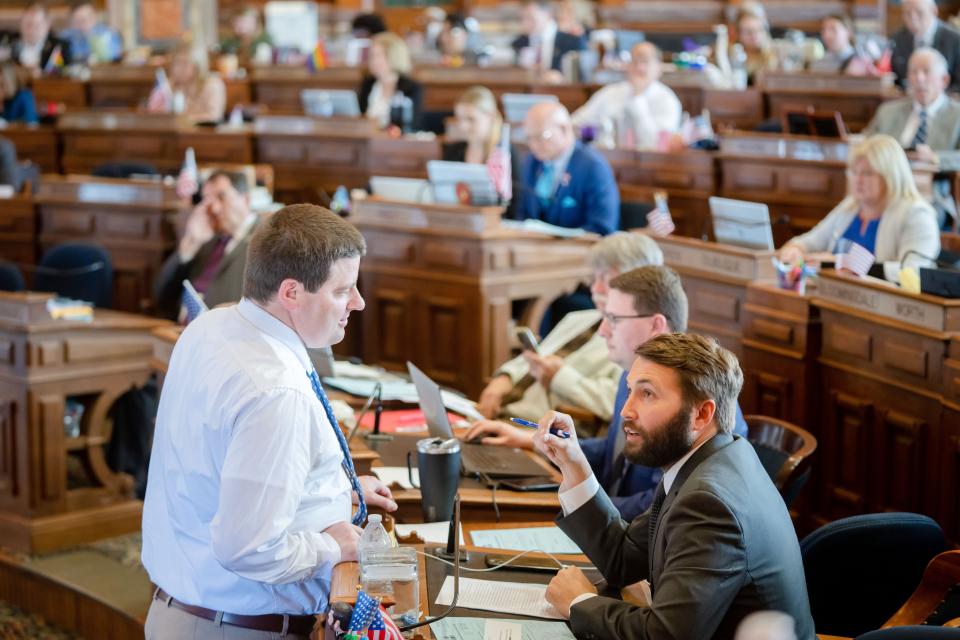Iowa House passes ballot measure that would require two-thirds approval for tax hikes
The Iowa House approved a constitutional amendment Tuesday that would require two-thirds of lawmakers to approve any future tax increases.
House Joint Resolution 2006, which passed on a 61-35 vote and now heads to the Senate, would ask voters to approve the higher threshold on any bill that increases the state's individual or corporate income tax rates.
If put on the ballot and approved, the amendment would make it far more difficult for lawmakers to reverse Republican-led cuts passed in recent years. Currently, all legislation regardless of subject is approved through a simple majority (50% plus one).
Rep. Bobby Kaufmann, R-Wilton, the amendment's sponsor, said it would mimic measures in place in a range of other states across the political spectrum.
"If this bill is good enough for the home state of President Biden, if it's good enough for the home state of Vice President Kamala Harris, if it's good enough for (California) Gov. (Gavin) Newsom … it's damn good enough for Iowa," Kaufmann said.

Democrats warned it would severely future legislatures' ability to address future budget deficits and economic hardships.
Rep. Adam Zabner, D-Iowa City, argued that without the ability to adjust income taxes with ease, lawmakers would have to make major cuts to critical programs, look at raising the sales tax or implement another tax like one on groceries.
"What this constitutional amendment does is to say next time there's a budget crunch, we're going to shift that burden onto the poorest Iowans, either by taking away services they rely on or increasing regressive taxes," Zabner said.
If the House-approved measure is approved by both chambers this session, it would be referred to next year's Legislature. If approved again next session, it would be placed on the ballot and require majority approval to amend the Iowa Constitution.
More: Iowa revenue projections updated as lawmakers weigh budget, tax cut decisions
Separate Republican amendment would impose permanent flat tax
Gov. Kim Reynolds and Republican legislators have sought in recent years to both cut down Iowa's rates while eliminating income brackets. Under changes to the tax code passed in 2022, Iowa's individual income tax rate is set to become a 3.9% flat rate by 2026.
Another amendment being considered by lawmakers this session would make that flat rate permanent, imposing a limited scale on future changes from lawmakers.
Kaufmann told reporters Monday that the House would likely debate that measure within a couple weeks. Like the legislative threshold amendment, it would require approval in two straight sessions before landing on the ballot for voters.
Reynolds this session has proposed accelerating a series of existing, gradual tax cuts and bringing the individual income rate down to a 3.5% flat rate next year.
Republican tax-writing chairs in the House and Senate, meanwhile, have introduced their own plans this session that would eventually eliminate the individual income tax. It remains to be seen in the coming weeks how lawmakers opt to tackle the issue.
Democrats have consistently opposed Republican tax plans, arguing they favor the wealthy while not suitably addressing costs of living for middle and lower class populations in Iowa. And they've called on GOP leadership to use the state's current budget surplus to further invest in education and other areas, rather than using it for further cuts.
More: Iowa Gov. Kim Reynolds' tax bill advances, but GOP lawmakers keeping options open for cuts
Sen. Dan Dawson, R-Council Bluffs, the chair of the Senate Ways and Means committee, told reporters earlier this month he also planned to advance separate constitutional amendments on a flat tax and higher legislative threshold for tax increases.
Galen Bacharier covers politics for the Register. Reach him at [email protected] or (573) 219-7440, and follow him on Twitter @galenbacharier.
This article originally appeared on Des Moines Register: Iowa House passes measure to require two-thirds vote for tax hikes